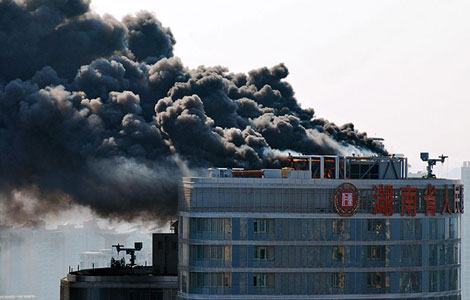Platini rejects goal-line move
Updated: 2011-12-10 08:20
(China Daily)
|
|||||||||||
 |
|
UEFA's President Michel Platini presents the trophy during the draw of the Euro 2012 soccer championship at the Palace of Arts in Kiev, Dec 2, 2011. [Photo/Agencies] |
VENICE, Italy - UEFA president Michel Platini spoke of his preference for human eyes over technology during European soccer's governing body's executive committee meeting on Thursday.
Earlier this week, FIFA president Sepp Blatter gave his backing to goal-line technology but Platini remained steadfast in his opposition to the idea, claiming UEFA's solution of putting two extra officials behind the goal was preferable to going down the route of electronic aids.
Blatter, however, said extra officials were too costly for poorer countries.
"We put (extra) human eyes to see if the ball has gone in. I like the five officials because it's a human system," said Platini.
"If you ask (UEFA referees chief Pierluigi) Collina, he will tell you that many good decisions have been taken that way.
"I understand FIFA says it will cost too much, but in any case it's not video refereeing, it's just on the goal-line.
"I'm not sure technology is important in such cases. If you consider the World Cup in 2010 and 1966, that's two cases.
"All that technology to use it twice in 40 years."
Platini was referring to two matches between England and Germany (West Germany in 1966).
England won the World Cup final at Wembley 4-2 in 1966, but debate still rages over whether its third goal, scored by Geoff Hurst, actually crossed the line.
And then last year, Germany was the beneficiary of a poor decision when a shot from Frank Lampard clearly went a foot or two over the line in their last-16 match but was not given.
Had it stood, England would have leveled the scores at 2-2 but instead went on to lose 4-1.
While both of those were high-profile cases, Platini fears introducing goal-line technology would lead to other areas also becoming affected by technology.
Agence France-Presse
- Thieves code used to protect residents
- China launches patrols along Mekong River
- Japan transfers crested ibis birds to China
- China 'serious' on IPR protection
- Shanghai's old elevator plant becomes temple
- China recognizes Russian election
- 9 injured in smoke alert aboard HK flight
- China continues to pursue peaceful growth
Hot Topics
HIV/AIDS, Egypt protest, Thanksgiving, climate change, global economic recovery, home prices, high-speed railways, school bus safety, Libya situation, Weekly photos
Editor's Picks

|

|

|

|

|

|






